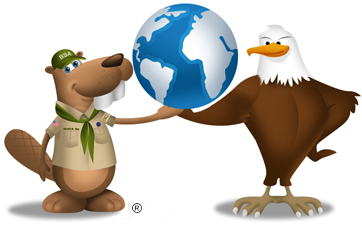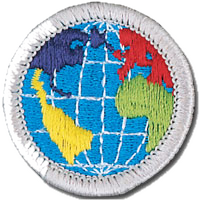Citizenship in the World


Resources
- Citizenship in the World Merit Badge Pamphlet
- Citizenship in the World Merit Badge Class Preparation Page
- Citizenship in the World Merit Badge Workbook
- Scoutmaster Bucky's Merit Badge Advancement Quick Reference
Related
Citizenship in the World Requirements
Current Scouts BSA requirements
as of January 24, 2026
as of January 24, 2026
1.
Explain what citizenship in the world means to you and what you think it
takes to be a good world citizen.
2.
Explain how one becomes a citizen in the United States, and explain the
rights, duties, and obligations of U.S. citizenship. Discuss the
similarities and differences between the rights, duties, and obligations of
U.S. citizens and the citizens of two other countries.
3.
Do the following:
a.
Pick a current world event. In relation to this current event, discuss
with your counselor how a country's national interest and its
relationship with other countries might affect areas such as its
security, its economy, its values, and the health of its citizens.
b.
Select a foreign country and discuss with your counselor how its
geography, natural resources, and climate influence its economy and its
global partnerships with other countries.
4.
Do TWO of the following:
a.
Explain international law and how it differs from national law.
Explain the role of international law and how international law can be
used as a tool for conflict resolution.
b.
Using resources such as major daily newspapers, the internet (with your
parent or guardian's permission), and news magazines, observe a current
issue that involves international trade, foreign exchange, balance of
payments, tariffs, and free trade. Explain what you have learned.
Include in your discussion an explanation of why countries must
cooperate in order for world trade and global competition to thrive.
c.
Select TWO of the following organizations and describe their role in
the world.
1.
United Nations and United Nations Children's Fund (UNICEF)
2.
International Court of Justice (The World Court)
3.
International Criminal Police Organization (Interpol)
4.
World Organization of the Scout Movement
5.
World Health Organization (WHO)
6.
Amnesty International
7.
International Federation of Red Cross and Red Crescent Societies
(IFRC)
8.
Cooperative for American Relief Everywhere (CARE)
9.
European Union
5.
Do the following:
a.
Discuss the differences between constitutional and nonconstitutional
governments.
b.
Name at least five different types of governments currently in power in
the world.
c.
Show on a world map countries that use each of these five different
forms of government.
6.
Do the following:
a.
Explain how a government is represented abroad and how the United
States government is accredited to international organizations.
b.
Describe the roles of the following in the conduct of foreign
relations: ambassador, consul, Bureau of Global Public Affairs, United
States and Foreign Commercial Service.
c.
Explain the purpose of a passport and visa for international travel.
7.
Do TWO of the following (with your parent or guardian's permission) and
share with your counselor what you have learned:
a.
Visit the website of the U.S. State Department. Learn more about an
issue you find interesting that is discussed on this website.
b.
Visit the website of an international news organization or foreign
government, OR examine a foreign newspaper available at your local
library, bookstore, or newsstand. Find a news story about a human right
realized in the United States that is not recognized in another
country.
c.
Visit with a student or Scout from another country and discuss the
typical values, holidays, ethnic foods, and traditions practiced or
enjoyed there.
d.
Attend or participate in a World Organization of the Scouting
Movement (WOSM) event such as the World Scout Jamboree, World Scout
Moot, World Scout Congress, Jamboree Over The Air, or Jamboreee Over The
Internet. Attendance at a national or regional Jamboree sponsored by a
WOSM-National Scout Organization is also allowed.
e.
Participate in or attend an international event in your area, such as
an ethnic festival, concert, or play.